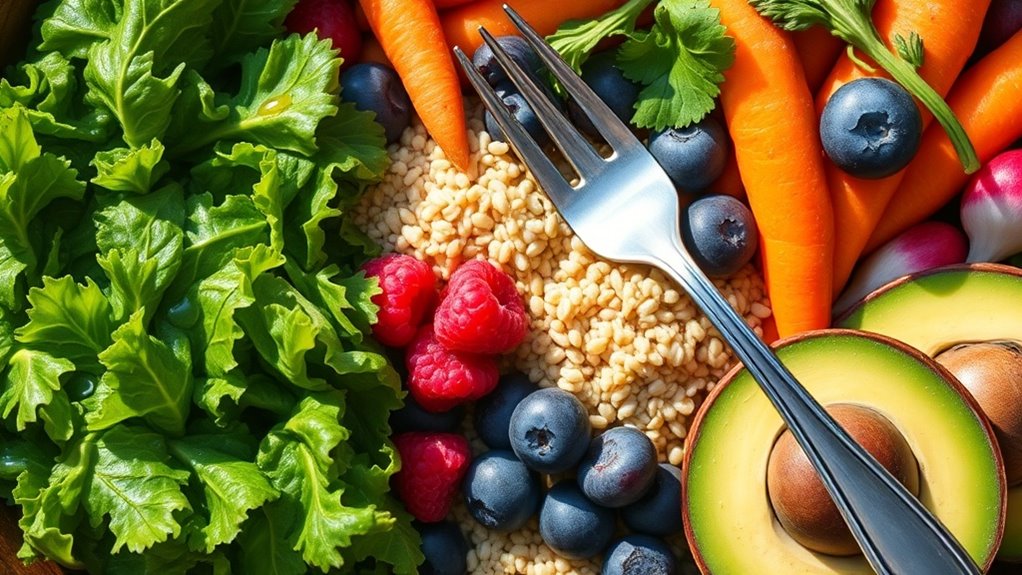Can Eating More Help You Weigh Less. Here’s the Truth
Yes, eating more nutrient-dense foods can actually help you weigh less. By focusing on fruits, vegetables, and whole grains, you can enjoy larger portions while consuming fewer empty calories. These foods stabilize your blood sugar, reduce cravings, and support a healthy metabolism. Plus, healthy fats and proteins keep your energy levels steady throughout the day. If you’re curious about how to incorporate these foods into your diet effectively, there’s more valuable information to explore.
Understanding Nutrient Density
When you think about eating healthier, understanding nutrient density is crucial.
Nutrient density refers to the amount of essential nutrients per calorie in food. By focusing on nutrient-dense options like fruits, vegetables, and whole grains, you can enjoy eating more while consuming fewer empty calories. This approach not only enhances your diet but also supports overall health and energy levels without restricting your food intake. Additionally, incorporating fiber-rich foods can help reduce cravings and stabilize blood sugar.
The Role of Metabolism in Weight Management
Although you may often hear about the importance of diet and exercise for weight management, metabolism plays a crucial role in how efficiently your body burns calories.
Your metabolic rate varies based on factors like age, gender, and muscle mass. Understanding your unique metabolism can help you tailor your eating habits and activities, leading to more effective weight management tailored to your body’s needs. Additionally, a balanced microbiome can influence your metabolism, impacting how well your body functions and utilizes energy.
How Increased Food Intake Can Reduce Cravings
When you prioritize nutrient-dense foods and maintain regular meal times, you may find that cravings decrease significantly. This approach helps your body receive the essential vitamins and minerals it needs, keeping hunger at bay. Staying hydrated also plays a crucial role in managing your appetite, as thirst can often be mistaken for hunger. Moreover, practicing portion control can ensure you enjoy nutritious foods without overindulgence.
Nutrient-Dense Foods Matter
Eating more nutrient-dense foods can significantly reduce cravings and help you maintain a healthier weight. By filling your plate with foods rich in vitamins, minerals, and fiber, you’re less likely to want empty-calorie snacks. Check out the table below for examples of nutrient-dense options:
| Nutrient-Dense Foods | Benefits |
|---|---|
| Leafy Greens | High in fiber, low in calories |
| Nuts and Seeds | Healthy fats, great for satiety |
| Berries | Rich in antioxidants |
| Quinoa | Complete protein source |
Regular Meal Timing
Maintaining regular meal timing can significantly curb cravings and support weight management.
When you eat at consistent times, your body learns when to expect food, helping stabilize blood sugar levels. This balance reduces those impulsive snack attacks, making it easier to resist unhealthy options.
Adopting a structured eating schedule can lead to mindful consumption, ultimately promoting healthier choices and a more balanced lifestyle.
Hydration and Hunger
Though many people often overlook hydration’s role in hunger regulation, drinking enough water can actually help reduce cravings.
Research shows that dehydration can confuse your body, leading it to signal hunger instead of thirst. By staying well-hydrated, you’re not only quelling false hunger pangs but also supporting your overall health and metabolism, making it easier to manage your food intake effectively.
The Impact of Eating More on Energy Levels
A well-rounded diet can significantly boost your energy levels throughout the day. When you consume a variety of nutrient-dense foods, your body gets the fuel it needs to function optimally. Here’s a quick comparison of energy sources:
| Food Type | Energy Provision |
|---|---|
| Complex Carbs | Sustained Energy |
| Healthy Fats | Long-lasting Fuel |
| Proteins | Muscle Repair |
Healthy fats, such as avocados and nuts, play a crucial role in keeping energy levels steady and supporting overall health.
Strategies for Incorporating More Nutrient-Dense Foods
When you’re looking to incorporate more nutrient-dense foods into your diet, start by making simple adjustments to your daily meals.
Swap refined grains for whole grains, and add leafy greens to your meals or smoothies.
Choose colorful fruits and vegetables for snacks, and include sources of healthy fats like avocados or nuts. These changes can boost your nutrient intake without increasing calories significantly. Additionally, incorporating leafy greens into your diet can aid digestion and promote fullness, further supporting your weight loss goals.
Real-Life Success Stories of Eating More to Weigh Less
Many people have successfully transformed their bodies by embracing the idea that eating more can actually lead to weighing less.
For instance, individuals who switched to whole foods and increased their meal frequency often reported shedding pounds. They found that nutrient-dense options not only satisfied their hunger but also boosted metabolism, supporting healthy weight loss.
These success stories illustrate the power of smart eating habits.




